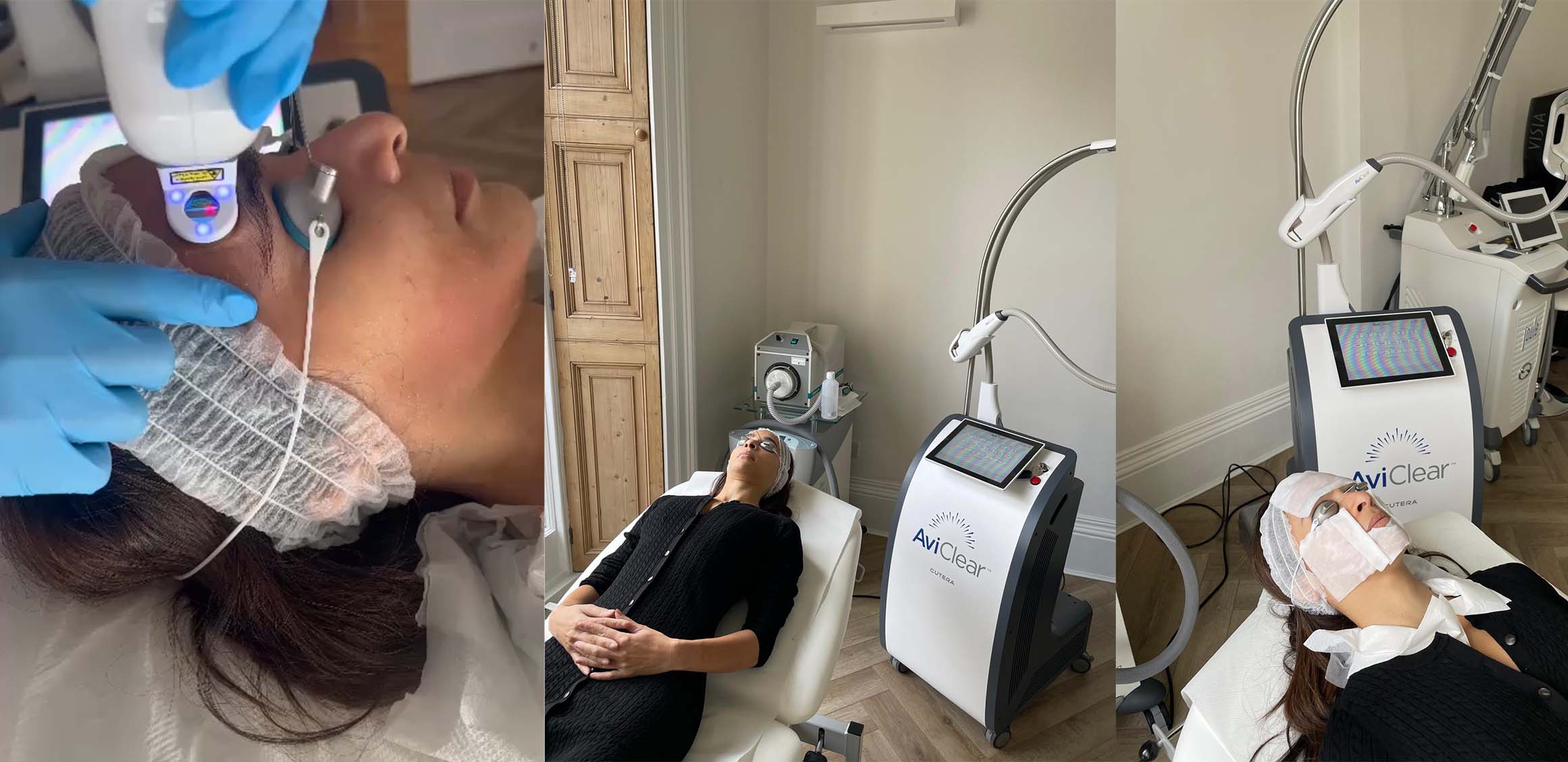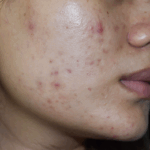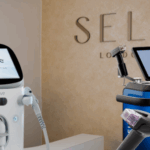
AviClear: The UK’s Most Advanced Laser for Acne: What You Need to Know, Explained by London Dermatologist, Dr Anjali Mahto
Acne remains one of the most misunderstood and emotionally charged skin conditions. For millions of people, it is not just a cosmetic concern. It is a source of psychological distress, loss of confidence, and in some cases, permanent scarring. For adults, particularly women, persistent acne can feel like a betrayal of everything they were told about growing out of it. For teenagers, it can feel like the defining feature of adolescence.
Until recently, options for moderate to severe acne were largely medical. Topical creams might offer limited improvement. Oral antibiotics, often prescribed for far too long, carry their own risks. Hormonal treatments may or may not be appropriate. And isotretinoin, while effective, is not a choice every patient is willing or able to make. This has left a significant gap for those seeking non-drug options with meaningful impact.
AviClear is the first and only laser cleared to treat acne by targeting the oil glands directly. It is not a facial. It is not a peel. It is a medical-grade laser treatment developed specifically to suppress sebaceous gland activity in a safe, sustained way. And it represents a genuine shift in how we approach acne treatment in dermatology.
At Self London, we have treated more patients with AviClear than any other UK clinic. This is not a marketing line. It is a reflection of real clinical volume, consistent protocols, and careful patient tracking. We were the first consultant-led clinic in the UK to adopt the technology, and we remain the most experienced centre offering it today.
This guide is designed to explain exactly what AviClear is, how it works, what we have observed in practice, and how to know whether it might be the right treatment for you.
How AviClear works
AviClear uses a 1726 nanometre wavelength, a specific laser setting chosen for its ability to target sebaceous glands. These glands sit within the dermis and are responsible for producing sebum, the oily substance that contributes to clogged pores and inflammation in acne-prone skin.
What sets this wavelength apart is that it does not rely on pigment or vascular targeting. It is absorbed by the water and lipid content of the sebaceous glands, delivering controlled thermal or heat energy that reduces their activity. Over time, with repeated treatments, oil production decreases and breakouts reduce. The skin becomes less congested, less inflamed, and less reactive.
Unlike broadband light, IPL, or superficial lasers, AviClear is not a surface treatment. It is not designed to exfoliate, stimulate collagen, or fade pigmentation. It is a targeted intervention aimed at the functional source of acne: the sebaceous gland. This is an active acne treatment.
What makes it different
There are several key reasons why AviClear is different from other acne treatments.
It is drug-free. No oral antibiotics, hormones, or isotretinoin are required. There is no daily regimen or blood monitoring.
It is suitable for all skin types. Because it does not interact with melanin, it is safe for darker skin tones, where many conventional acne lasers carry risks of hyperpigmentation or scarring.
It is a finite course. Three sessions, spaced four weeks apart, form the core of treatment. Some patients may opt for maintenance sessions later, but there is no requirement for indefinite care.
It has minimal downtime. Most patients return to normal activities immediately after treatment. There is no peeling, no crusting, and no restriction on sun exposure beyond standard sunscreen use.
At Self London, we have found it particularly valuable in patients who have been caught between ineffective skincare and hesitation around stronger medication. These are often women in their 30s or 40s, dealing with U-zone acne that does not respond well to traditional topicals or oral contraception, patients who have previously had isotretinoin and relapsed, those looking for a “drug-free” approach, women who may be thinking of trying to conceive and keen to stop their contraception, male patients with oily skin, patients taking spironolactone who find their acne relapses when trying to stop their tablet treatment, teenagers studying for exams who wish to avoid powerful medication, to name a few of the types of cases we treat.
What to expect during treatment
Each AviClear session takes between 30 and 45 minutes. The face is cleansed and then hydrated with water and wet gauze. The laser handpiece is passed methodically across the treatment areas, delivering heat in a controlled pattern. The sensation is variable. Some describe it as warm. Others find certain areas, particularly the temples and chin, more uncomfortable.
We typically advise patients to take paracetamol beforehand if they are concerned about discomfort. In our clinic, we have observed that most patients tolerate the second and third sessions better than the first. There is no anaesthetic required, no injections, and no sedation.
All patients at Self London are reviewed by a Consultant Dermatologist or Specialist Dermatology GP prior to treatment. This is important. AviClear is not suitable for every type of acne, and success depends heavily on accurate diagnosis following proper medical history and examination. Treatments are carried out by our lead laser therapist under strict consultant-led protocols, ensuring both safety and consistency. These protocols are not a “one-size-fits-all” or recipe book to be followed, and everyone’s individual circumstances are considered.
Post-treatment: what happens next
Following each session, patients may notice mild redness or warmth in the skin. This typically settles within a few minutes to a few hours. Unlike fractional lasers or peels, AviClear does not induce surface trauma, so there is no visible peeling or rawness.
In some cases, patients experience a flare-up of breakouts after the first or second session. This is not uncommon and can feel disheartening. However, in our experience, it often signals the beginning of sebaceous gland response, particularly in patients with highly active oil production. These flare-ups usually settle within a fortnight and are managed supportively. On occasion, we can also prescribe some oral medication to help, if needed.
Most patients begin to notice reduced oiliness within a few weeks. Pores feel less congested. Shine decreases. Spots may still occur but tend to be smaller, fewer, and less inflamed. Visible results usually become clear four to six weeks after the third session, although individual results can vary. In our cohort, some patients reported changes as early as session two, while others noticed steady progress over several months.
What type of acne responds best?
AviClear is most effective in inflammatory acne where sebum plays a clear role. This includes:
- Papulopustular acne (raised red spots with or without pus)
- Nodular or cystic acne (deeper, painful lesions)
- Relapsing acne in adults, particularly post-isotretinoin
- Seborrhoeic skin types with persistent oiliness
We have seen particularly strong results in patients with hormonal U-zone acne, where breakouts affect the chin, jawline, and lower cheeks. In these cases, we often observe oil control before lesion reduction, a sequence that can be reassuring to both clinician and patient.
AviClear is not designed for blackheads alone, nor for acne that is driven by cosmetic triggers, poor skincare hygiene, or occlusion. Those cases require other additional interventions, sometimes in conjunction with laser treatment.
What about skin of colour?
AviClear is safe for all Fitzpatrick skin types. The laser wavelength does not target melanin, which means the risk of post-inflammatory hyperpigmentation is extremely low. At Self London, we treat patients across the full spectrum of skin types, and we have not observed any pigmentary complications in our AviClear cohort to date.
Fluence or energy settings are adjusted based on oil production, tolerance, and acne severity, not skin tone. This is important. Clinics with less experience may reduce fluence unnecessarily in darker skin, leading to under-treatment. Proper training and confidence in managing diverse skin types are essential.
Is AviClear permanent?
This is one of the most frequently asked questions. The answer is nuanced. AviClear is designed to create long-term suppression of sebaceous gland activity. Studies show results lasting up to two years and beyond. In our own practice, many patients have experienced sustained clearance for over a year post-treatment.
However, acne is a chronic condition influenced by multiple factors. Hormonal fluctuations, stress, diet, medication, and genetics all play a role. AviClear is not a cure. It is a powerful tool that shifts the balance in your favour, but relapses can occur; this is true of all acne treatments including isotretinoin (Roaccutane). When relapses occur, patients may choose to have a single stand-alone top-up session of AviClear, or explore maintenance pathways depending on the pattern of return.
At Self London, we do not push maintenance packages. We follow patients up according to clinical need, not marketing cycles.
AviClear vs isotretinoin: which is better?
This comparison is inevitable. Isotretinoin (Roaccutane) is still the most effective systemic (internal or tablet) treatment for severe, scarring acne. It works by shrinking sebaceous glands, reducing inflammation, and normalising skin turnover. For many, it is life-changing. For others, it is daunting.
The decision to take isotretinoin is not straightforward. It involves regular blood tests, contraceptive requirements, dry skin, mood considerations, and dietary restrictions. Some patients are unable to take it for medical reasons. Others have tried it before and relapsed.
AviClear offers a different proposition. No pills. No prescriptions. No systemic risk. It may not match isotretinoin in raw efficacy (there are no head-to-head clinical trials to look at this), but it offers freedom, freedom from medication, from monitoring, from side effects.
In some cases, we have used AviClear after isotretinoin to reduce relapse. In others, it has delayed or even replaced the need for medication altogether. Each case is different. At Self London, we offer both, and advise based on evidence, not preference. As acne is one of the leading conditions we treat in our clinic, our vast experience allows us to mix and match or tailor treatment as required with ease and confidence.
Why clinic experience matters
AviClear is a powerful device, but like all medical technology, outcomes depend on operator experience, patient selection, and clinical judgement. The same machine in two different clinics can deliver radically different results.
At Self London, we have performed more AviClear treatments than any other UK clinic. We have data, not just anecdotes. We have adapted fluence settings, mapped response timelines, and developed a realistic picture of what patients can expect. We have seen who flares, who clears, who plateaus, and who needs something else. This matters. When you are investing in a treatment that is new to the UK market, clinical insight is not optional. It is the difference between a promising result and a disappointing one.
Final thoughts
AviClear is not a trend. It is not a rebranded facial or a relabelled device. It is a laser built from the ground up to treat acne and it delivers. In the right patients, with the right protocol, it can reduce oil production, lower inflammation, and provide long-term remission without medication. It is not for everyone. But for many, it represents the first real alternative to years of prescriptions, side effects, and frustration.
At Self London, we are proud to lead this space. Not because we were the first, but because we continue to treat real acne every day, with rigour, compassion, and clinical accuracy.If you are struggling with acne and want a modern, evidence-based approach, we would be happy to help.
Book a consultation to learn whether AviClear is right for you.





